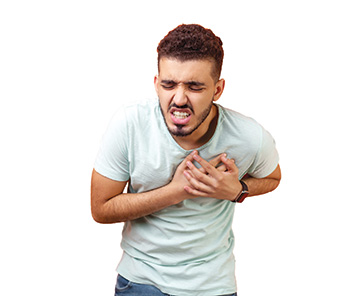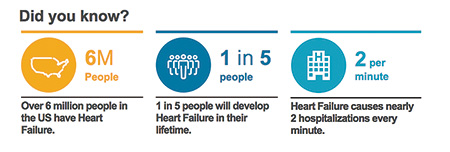
Uh-oh! Am I having a heart attack?
Chest pain can be incredibly scary. Sometimes it comes out of nowhere and can take your breath away. It’s important to know that not all chest pain means you’re having a heart attack, even though that might be where your mind goes first.
And not all heart attacks cause chest pain.
The classic signs of a heart attack are:
- Killer chest pain, like an elephant sitting on your chest.
- Pain radiating down your left arm.
- Pounding or racing heart.
- Sweating, especially the quick onset of cold sweating.
The more subtle signs of a heart attack may not be on your radar, such as:
- Prolonged pain or discomfort in the arm, jaw, neck or stomach.
- Shortness of breath, nausea, fatigue, lightheadedness and/or cold sweats.
- Feeling of impending doom.
To find comfort, you can try changing position, taking antacids, drinking water or taking deep breaths. These actions can feel helpful, but if the pain persists or recurs after your efforts, you should seek medical attention. The biggest red flag that you’re having a heart attack is unrelenting pain, lasting five minutes or more. When in doubt, call 9-1-1.
WHEN IT’S NOT A HEART ATTACK
Not all chest pain immediately triggers a heart attack. Here are four other chest pain possibilities:
- Brief “lightning bolt” or “electrical shock” sensations. Generally, a cracked rib, pulled chest-wall muscle or even shingles can cause this type of chest pain.
- Pleurisy, pneumonia or asthma. Pinpoint discomfort that worsens when changing position. If chest pain shifts with breathing, it’s likely one of these three ailments.
- Acid reflux. If sharp chest pain improves with movement and exercise, it’s most likely to be caused by an issue like acid reflux.
- Panic attacks. A panic attack is very frightening, especially if you’ve never experienced one before. While not life-threatening, the sudden attack of fear and anxiety can interfere with your quality of life and mental health. Symptoms of a panic attack closely mirror the symptoms of a heart attack.
Remember, heart attack symptoms can vary, and women’s symptoms are usually more subtle than men’s. If your chest discomfort is fleeting but severe, or if mild chest pain never completely goes away, make an appointment to see your primary care doctor as soon as possible. If you’re not sure what is causing your pain, err on the side of caution, pick up the phone and call 9-1-1.
Can you recognize these signs of heart failure?
The symptoms of heart failure are often confused with signs of aging. But the real cause of most heart failure symptoms is fluid buildup and reduced blood flow.
WHAT TO LOOK FOR AND WHY IT HAPPENS
Be sure to call your doctor if you notice any new or worsening symptoms. Also, keep in mind that you may have some of the symptoms below, but not others.
- Shortness of breath with everyday activities – The heart can’t pump enough to keep up with the blood supply. This causes fluid to back up and leak into the lungs.
- Swelling in legs, feet, and ankles – Fluid backs up and collects in the tissues. The heart isn’t able to pump strongly enough to manage its workload.
- A dry, hacking cough that doesn’t go away – The cough is caused by fluid backing up and leaking into the lungs. That’s because the heart can’t keep up with pumping the blood to the rest of the body.
- Trouble sleeping when you lie flat – Fluid backs up into the lungs because the heart can’t keep up with the blood supply.
- Rapid weight gain (three or more pounds in a day) – The heart can’t keep up with the incoming blood supply, so fluid backs up and collects in the tissue.
- Feeling tired – The limited blood supply is sent away from arm and leg muscles to supply the body’s main organs, like the heart and brain.
KNOW WHEN TO TAKE ACTION
If you experience worsening symptoms, like shortness of breath or rapid weight gain, call your doctor. You may be retaining water, which can put you at greater risk for hospitalization.
(Information from Keep It Pumping, https://www.us.keepitpumping.com)



